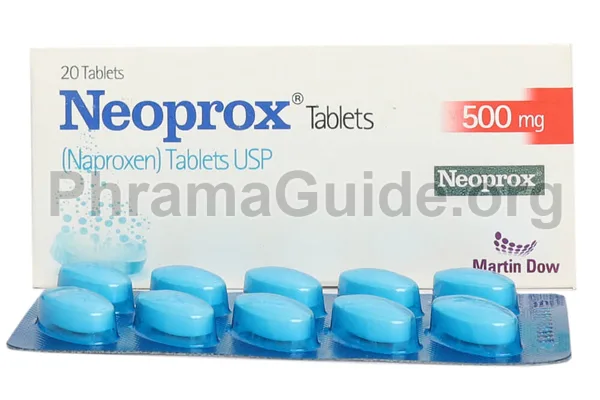Neoprox is a nonsteroidal anti-inflammatory drug (NSAID) commonly used to relieve pain, reduce inflammation, and lower fever. Like all medications, it can potentially cause side effects. It’s important to note that not everyone will experience these side effects, and some people may experience them to varying degrees of severity. If you have concerns about Neoprox or are experiencing side effects, you should consult with a healthcare professional.
Gastrointestinal Issues
- Stomach pain
- Heartburn
- Nausea
- Vomiting
- Diarrhea
- Constipation
- Ulcers or bleeding in the stomach or intestines (less common but more serious)
Cardiovascular Effects
- Increased risk of heart attack or stroke, especially when used at high doses or for prolonged periods
Allergic Reactions
- Rash
- Itching
- Swelling of the face, lips, tongue, or throat (angioedema)
- Difficulty breathing
Central Nervous System
- Headache
- Dizziness
- Drowsiness
- Fluid Retention:
- Swelling of the ankles, feet, or hands (edema)
Blood Disorders (Rare)
- Decreased platelet count (thrombocytopenia)
- Anemia
- Changes in white blood cell counts
Kidney Effects (Rare)
- Decreased kidney function or kidney damage
Liver Effects (Rare)
- Liver dysfunction or damage
Skin Reactions (Rare)
- Severe skin reactions such as Stevens-Johnson syndrome or toxic epidermal necrolysis (very rare but potentially life-threatening)
- Tinnitus (ringing in the ears) or changes in hearing (rare)

What is Neoprox?
Neoprox is one of the leading brands of Naproxen, manufactured and marketed by Martin Dow Pharmaceuticals, Pakistan.
Neoprox : Available Formulations and Strengths
Presently, Neoprox is available in tablet form
Neoprox Tablets : 250mg, and 500mg strengths
What Are The Possible Drug Interactions of Neoprox?
- Other NSAIDs: Taking multiple nonsteroidal anti-inflammatory drugs (NSAIDs) together, can increase the risk of gastrointestinal bleeding and ulcers.
- Antiplatelet Medications: Combining Neoprox with antiplatelet drugs like aspirin or clopidogrel may increase the risk of bleeding.
- Anticoagulants: Neoprox can interact with blood thinners (anticoagulants) like warfarin, increasing the risk of bleeding.
- Corticosteroids: Concurrent use of corticosteroids, such as prednisone, with Neoprox, can increase the risk of gastrointestinal bleeding and ulcers.
- Selective Serotonin Reuptake Inhibitors (SSRIs) and Serotonin-Norepinephrine Reuptake Inhibitors (SNRIs): Neoprox may increase the risk of bleeding when taken with medications like fluoxetine (Prozac) or venlafaxine (Effexor).
- Methotrexate: Neoprox can reduce the elimination of methotrexate from the body, potentially leading to increased methotrexate levels and toxicity.
- Lithium: Neoprox can increase lithium levels in the blood, which can be toxic.
- Diuretics: Some diuretics, such as furosemide, may have reduced effectiveness when taken with NSAIDs like Neoprox.
- ACE Inhibitors and Angiotensin II Receptor Blockers (ARBs): Combining Neoprox with these medications used for hypertension can reduce their effectiveness and may lead to decreased kidney function.
- Cyclosporine: Neoprox can increase the blood levels of cyclosporine, a medication used to suppress the immune system, which may lead to kidney damage.
- Antihypertensive Medications: Neoprox can reduce the effectiveness of some blood pressure medications, potentially leading to increased blood pressure.
- Mifepristone: Neoprox should not be used within 8-12 days after taking mifepristone for termination of pregnancy, as it may reduce the effectiveness of mifepristone.
- Other Medications: There can be interactions with various other drugs, including certain antibiotics, antifungal medications, and drugs used for heart conditions.

Leave A Comment